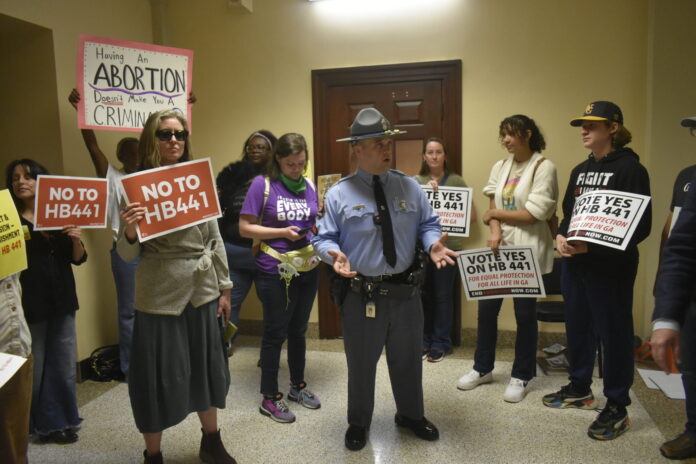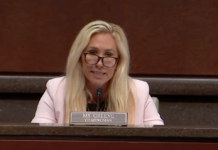
(Georgia Recorder) — A House panel heard hours of testimony Wednesday on a bill that would expand Georgia’s law to completely ban and criminalize abortion, while even some anti-abortion groups oppose the measure.
No vote was taken on House Bill 441, and no vote is planned, but the surprise late-session hearing drew hundreds of people to the state Capitol Wednesday who either pushed for the long-shot bill or urged lawmakers to steer clear of a bill that they warned would undermine a popular proposal to protect access to in-vitro fertilization.
Sign-toting supporters of the bill sang hymns and prayed aloud as opponents passed out stickers that said “support and compassion – not punishment” and held their own counter-protest signs in a cramped committee room before the over-capacity crowd was ushered out into the hallway to wait their turn to have their say.

The public airing of the controversial bill Wednesday was tense and came the day before the Senate is expected to finalize a bipartisan measure designed to protect access to IVF. That bill, House Bill 428, passed unanimously in the House and was supported by the sponsors of the proposed total ban on abortion.
“Tens of thousands of babies, made in the image of God, continue to be murdered in our state every year, all within the bounds of the current law. That must be changed,” said the bill’s sponsor, Rep. Emory Dunahoo, a Gillsville Republican.
Georgia’s current law bans most abortions once fetal cardiac activity is detected, which is at about six weeks and before many women know they are pregnant. The law, which took effect in 2022 after Roe v. Wade was struck down, allows for a few limited exceptions, including some – in the cases of rape and incest – that would be wiped away by Dunahoo’s bill.
Under his bill, abortions after fertilization would be deemed a homicide. A pregnant woman could be charged with a crime, unless she can prove she was forced into having the abortion.
But even prominent anti-abortion advocates in Georgia argue the bill goes too far. The Georgia Life Alliance submitted a letter to the House Judiciary Non-Civil Committee opposing the bill and objecting to the hearing even being held.
“Regardless of one’s beliefs on access to abortion, women and girls should not be further traumatized from their abortion by the fear of criminal prosecution,” wrote Claire Bartlett, the group’s executive director, and Bryan Tyson, the group’s board chairman.
A former anti-abortion lobbyist in Georgia also testified against the bill Wednesday.
“This is just really bad legislation, whether a woman has been sexually assaulted or is pregnant and facing a crisis,” said Elizabeth Edmonds. “This is not compassion. This is not how Jesus would love us.”
Several metro Atlanta doctors urged lawmakers to oppose the bill, saying it would end IVF treatment in Georgia.

During IVF, doctors typically harvest and fertilize multiple eggs in the hope that at least one results in a successful pregnancy. Unused embryos, which are only days old and barely visible to the naked eye, are often allowed to thaw out and be destroyed.
Dr. Karenne Fru, who is the founder and owner of a fertility clinic in Sandy Springs, said she tells all her patients that they may start out with 20 eggs but wind up with two embryos.
“Am I guilty of murder? That makes me a serial killer. What? My whole life is doing God’s work,” Fru said in impassioned comments. “He said, ‘Go forth and procreate.’ I’m doing that. Please. Just let me continue to do that. I cannot go to jail because I want to help people become parents, and this bill criminalizes what I do.”
Rep. Charlice Byrd, a Woodstock Republican who is a co-sponsor of the bill, questioned another one of the doctors how the measure would affect IVF access.
Dr. Kathryn C. Calhoun said granting embryos full legal personhood from the time of fertilization and making abortion a homicide would deter doctors from offering seemingly legal procedures.
Calhoun explained that it can take many embryos to be successful and that sometimes those embryos stop growing in the lab because they are not healthy enough to survive.
“If our embryologists or our doctors or any of the providers in our clinic could be held criminally liable for the fact that an embryo didn’t make it in a dish by no fault of their own, but just by biology or God’s will or whatever you all want to believe about that, we wouldn’t be able to practice,” Calhoun said. “The threat and the danger would be too real to ourselves and our own families to practice that in the state of Georgia.”
The bill is part of a national effort backed by End Abortion Now, which is one of the male-run groups pushing for stringent anti-abortion restrictions and penalties. And many of the proponents who spoke in favor of the bill Wednesday were from outside of Georgia.
But not all the supporters were out-of-towners. Nikki Crannell said she and her husband, who live in Gainesville, reached out to the group. The couple said they recognize it could take years of advocacy to get such a bill passed in Georgia.
Crannell said she has concerns about IVF.
“Those babies are babies made in the image of God too and are just sitting in the freezer, who also need a right to life,” Crannell said.

With the session set to end April 4, Wednesday’s hearing will likely be the most action the bill gets this year, though it will still technically be in play when lawmakers return next January. More moderate Republicans like Rep. Sharon Cooper say they have no interest in going further than Georgia’s current law.
Cooper, who chairs the House Public and Community Health Committee, also said she agrees with concerns that Dunahoo’s bill would threaten IVF access.
“I believe that we have gone as far as we should go on that issue,” the Marietta Republican told a reporter Wednesday, referring to abortion. “And that bill also interferes with, or would interfere with, people who are trying to get pregnant using in vitro, and I am certainly against that. And it’s a hearing only, but I certainly hope that that’s all it is, a hearing.”
The Senate is set to vote on a bill that would protect access to IVF treatment but would not regulate it. That bill is a priority of House Speaker Jon Burns, a Newington Republican who reiterated his support for the proposal Wednesday when asked through his spokesperson about the hearing on the strict abortion bill.
“While the House’s bill codifying protections for IVF is still moving through the legislative process, it will without a doubt strengthen the ability of countless Georgia families to bring life into the world,” Burns said in a statement.
But reproductive rights advocates like Allison Coffman, who is the executive director of the Amplify Georgia Collaborative, argued that it is harmful to even hold a hearing on what she described as one of the most extreme forms of an abortion ban.
“We are letting it see the light of day,” Coffman said. “We are saying that this is something that this committee, that this Legislature thinks is important enough to put to public discussion.”
Georgia Recorder reporter Ross Williams contributed to this report.







